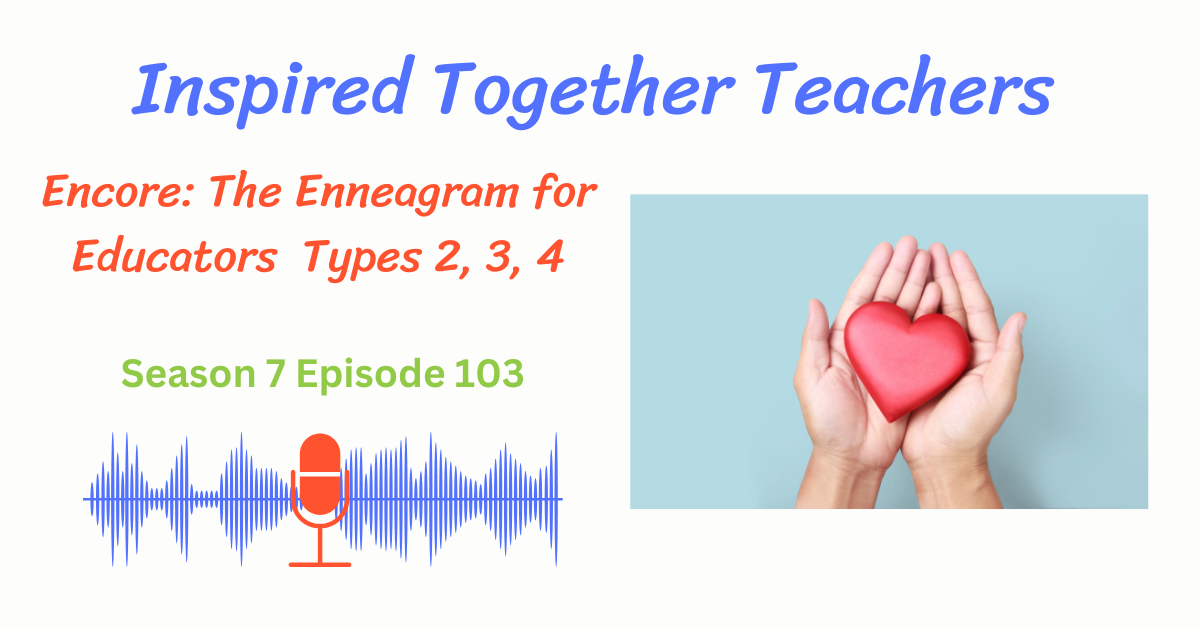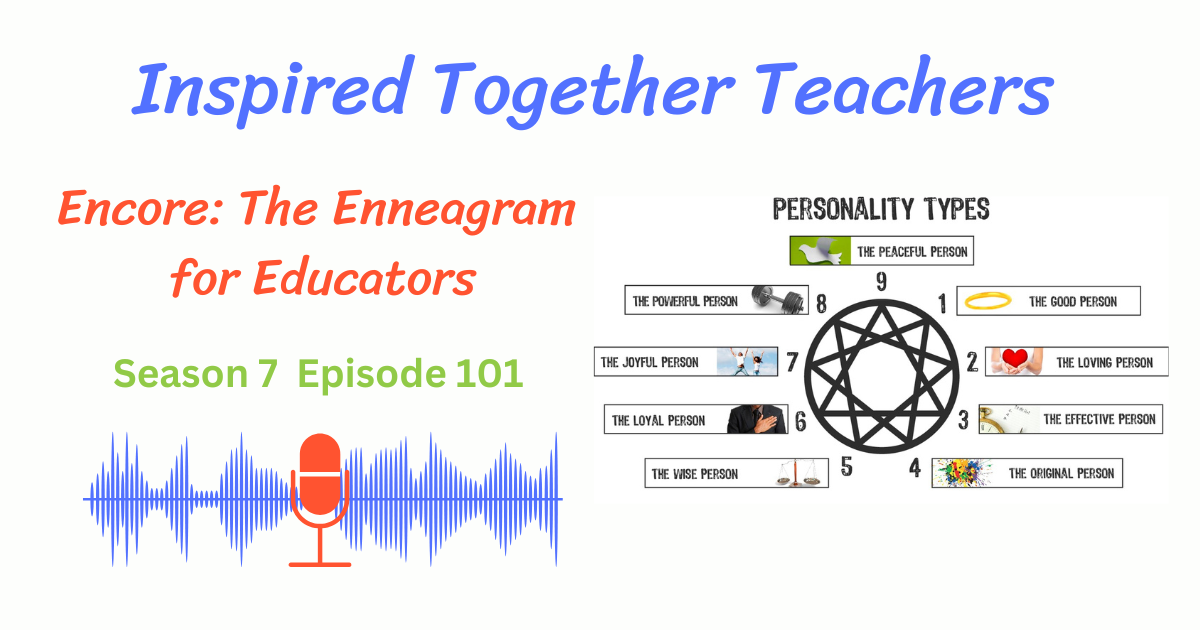Season 7 Episode 104
Check out this episode to understand how Enneagram types 5, 6, and 7 think, act, and are motivated!
Show notes:
Episode Summary:
If you want to learn more about the Enneagram and how Enneagram patterns play out in your life and in the lives of others around you, stay tuned. This is part four of our Enneagram series. Today we are going to talk about the head types- five, six and seven. What does it mean to be a head type and how does that show up in you or in your family, friends, and students? Let’s find out!
In this episode:
Welcome back to our special series on the Enneagram. The following show notes are a summary of the episode, not a complete transcript. To hear all of the discussion and personal examples, please listen to the episode.
Introduction:
This is part four of our Enneagram for Educators series. If you missed episode 101 which was an introduction to the Enneagram, episode 102 where we discussed types 8, 9, and 1, or episode 103 where we discussed types 2, 3, and 4, you may want to go back and listen to those episodes. In fact, we recommend going back and listening to them all because if you only have information about three of the types, you don’t have the big picture of the Enneagram. Today we are going to talk about the head or thinking types. These are types 5, 6 and 7.
Characteristics of Enneagram Type 5
If you remember our Wizard of Oz analogy from the episode 34, The Scarecrow sang, “If I only had a brain”. The Scarecrow represents the thinking types.
Type 5s are sometimes known by the labels The Wise Person, or The Observer. As always, we don’t focus on labels as much as on patterns of behavior.
As we talk about the types, remember that every type has both positive patterns and patterns that are potentially troublesome. You do not have to have all the patterns of your type, and in particular, a person who has done some growth and transformation work may have few if any of the more negative patterns. That said, those patterns are always in the background, ready to come into play if you are tired or stressed or going through a difficult time in your life.
What are some of the patterns of the type 5?
Positive patterns of the 5:
- Wise
- Knowledable
- Visionary
- Comfortable with innovative and complex ideas
- Observant- they are people watchers and notice things
- Good at synthesizing ideas
- May be reserved or very witty
- Analytical
- Often keep their feelings to themselves
Negative patterns of the type 5:
- Protective of energy
- Carefully guards privacy and space- they can isolate
- Overthinking or over-analyzing
- Intellectually arrogant
- Negative
- Controlled
- Detached- from others, from emotions and from their bodies
- Intense
- Highly anxious
Basic fears and way of seeing the world:
Fives fear being seen as incompetent. They find security in watching, analyzing, learning, and understanding the world around them.
5’s are generally calm, wise and perceptive. They love to learn and are curious. They can go down deep rabbit holes when something interests them. They bring the gift of understanding complex ideas and bringing creative innovations to the world.
The challenge for fives is to not get stuck in their heads or detach from others in their relentless pursuit of knowing.
Characteristics of Enneagram Type 6
Sixes are known as The Loyal Person or The Loyalist.
Positive patterns of the Type 6:
- Reliable and responsible
- Hard -working
- Trustworthy
- Compassionate
- Loyal
- Sympathetic to the underdog
- Warm and friendly
- Vigilant
- Fearful or worried
- Careful
- Good problem solvers
Challenging patterns of the Type 6:
- Fixated on worse-case scenarios
- Either withdraw to protect themselves or confront fearful situations head or seek them out and confront them
- Relentless in getting what they want
- Desperate to feel a sense of belonging
- Overly cautious
- Full of self-doubt
- Highly anxious
Basic fears and way of seeing the world:
The six’s basic desire is to be secure in a world they may see as fraught with danger. They want to find a secure group and a secure place to fight against anxiety and insecurity. They anticipate danger and plan ahead to protect themselves as a way of controlling their fears. Sixes often like to organize and plan things, which is an effective way of helping them to reduce anxiety caused by not knowing.
Sixes have great instincts, but don’t always trust themselves because they are too busy over-thinking.
Characteristics of Enneagram Type 7
The type seven is known as The Joyful Person or the Enthusiast. 7s bring the joy!
Positive patterns of the Type 7:
- Optimistic
- Spontaneous
- Playful, fun, humorous
- High-spirited
- Seek new and exciting experiences
- Want to taste everything life has to offer
- Visionaries
- Highly accomplished
- Full of gratitude, they love life
- They are very social and good cheerleaders for others
Challenging patterns of the Type 7:
- Addicted to being happy
- FOMO
- Like to keep all their options open, which can lead to indecision or lack of commitment
- Overly extended or scattered
- Undisciplined
- Easily distracted
- Easily bored
- Must avoid the pain of life at all costs
Basic fears and way of seeing the world:
Seven’s do not want to miss out on any of life’s pleasures. They love freedom to explore and do fun, and interesting things.
Seven’s fear is feeling pain or being deprived of something joyful. They will do to great lengths to avoid feeling anything unpleasant, which means they often need to be “doing” to avoid feeling.
Before we recap, know that the next episode is the final episode in this series. We’re going to bring all of this together and talk about how you can use this information in your life and work.
Recap:
The thinking types of 5, 6 and 7, lead with their heads, constantly filtering the world through their mental faculties. The inner life of the mind gives them energy and inspiration. They tend to analyze and plan, which provides security. Under stress, they can overthink, over-plan or withdraw, which leads to isolation and anxiety which can get in the way of decision making or action.
Connect with the Inspired Together Teachers Community:
Website: https:www.inspiredtogetherteachers.com
Instagram: Inspired-Together-Teachers
Facebook: Inspired Together Teachers
Facebook Teacher Warriors Group: Teacher Warriors Facebook Group
Linked In: Inspired Together Teachers
More About Inspired Together Teachers:
Are you a teacher struggling to balance your best work with your best life?
If you are dedicated and caring but often overwhelmed and exhausted, join us at Inspired Together Teachers. We’ll give you inspiration, strategies and tips that help you navigate life’s challenges as a stronger, more confident, and more joy filled person, both in and out of the classroom.
Inspired Together Teachers will give you practical tools to experience more of what matters most in your life.
Co-hosts Paula Schmidt and Michele Vosberg are award winning educators with the experience and skills to help teachers thrive in life and work. They’ve taught at all levels, worked with thousands of teachers, and conducted workshops around the world. They are also the authors of the #1 best-selling book The Inspired Teachers Journal: A Weekly Guide to Becoming Your Best Self.
Paula and Michele would love to have you to join them on their quest to lived inspired lives.






